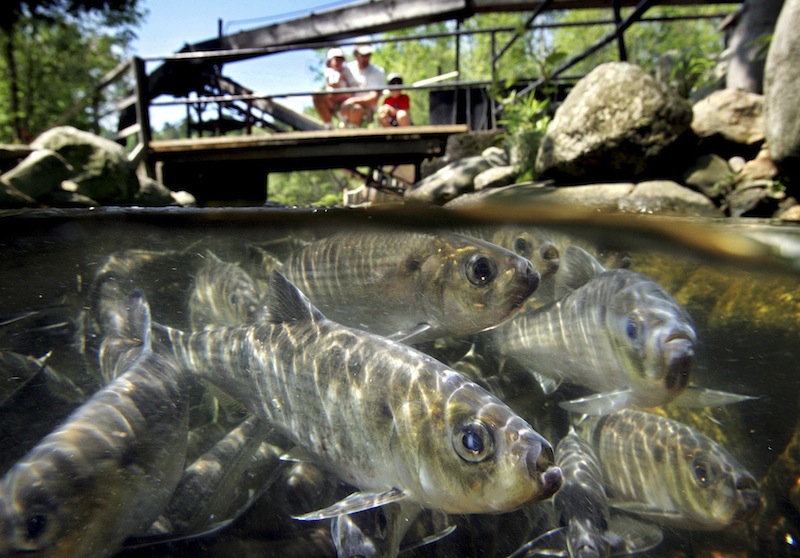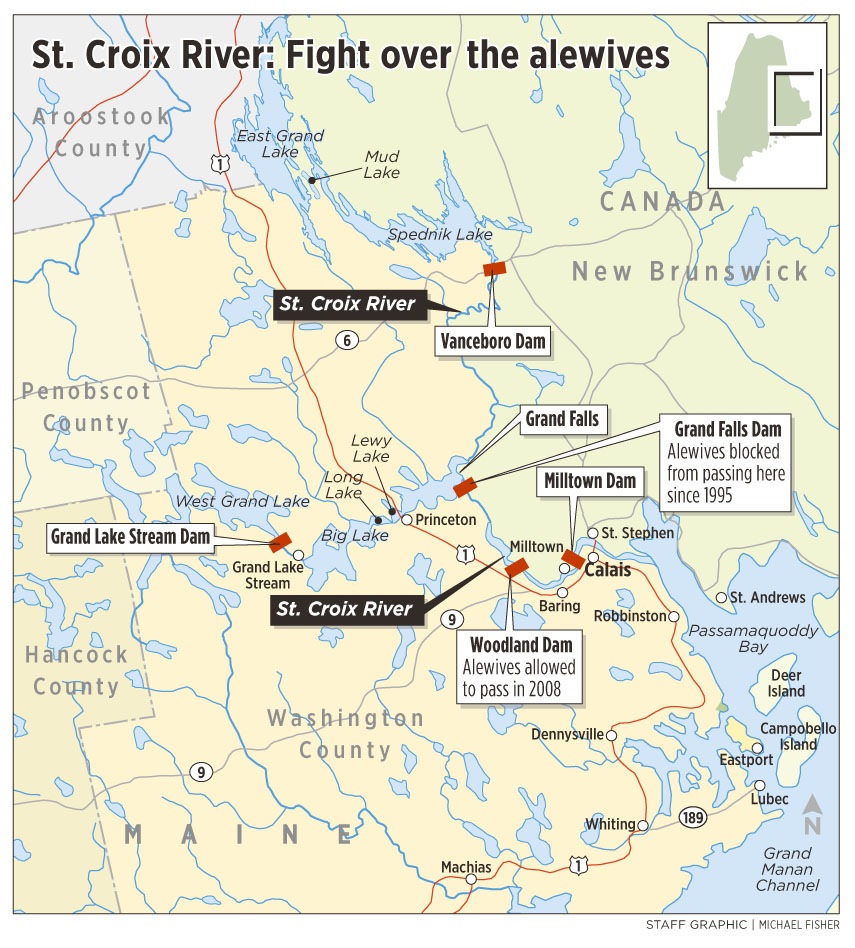Maine’s attorney general said Wednesday that Gov. Paul LePage is committed to a controlled reintroduction of alewives to the middle reaches of the St. Croix River but that the state rejects a federal agency’s assertion that it must do so to comply with federal law.
In a letter to the Environmental Protection Agency, Attorney General William Schneider said, in effect, that the agency’s disapproval of a 2008 law banning alewives from reaching spawning habitat in much of the St. Croix watershed has no practical effect, because it “merely prevents Maine from doing something that it has never done, has never tried to do, and has no intention of doing, which is to apply the Alewife Law for (federal Clean Water Act) purposes.”
Schneider’s letter was a response to a directive from the EPA on July 9 that said Maine’s 1995 and 2008 Alewives Laws violate the federal Clean Water Act so they’re invalid.
The laws, which close the fishways at the Grand Falls Dam to alewives, were passed at the behest of smallmouth-bass fishing guides, who fear that spawning alewives would harm bass populations.
The EPA acted in response to a lawsuit filed in May by the Conservation Law Foundation charging the federal agency with failing to enforce the act. The directive was issued a day after publication of a Maine Sunday Telegram story on the 17-year battle over the alewives’ access to the river.
In his letter to the EPA, Schneider wrote that he had consulted with LePage, who is committed to a compromise plan developed by an international body that resolves disputes on the river, which forms the boundary between the U.S. and Canada in eastern Maine.
The letter indicates that the governor will back efforts to allow a limited number of alewives to spawn farther up the river system than they are now allowed, which would require lawmakers to alter the law. He and Schneider apparently do not believe the EPA ruling compels them to act.
“The state has always regarded the Alewife Law to be a fisheries management measure with meaning and effect only in that context; it has never considered the statute to be a (Clean Water Act) standard,” Schneider wrote.
Sean Mahoney, attorney for the Conservation Law Foundation, said he is disappointed with the state’s position, because the attorney general effectively ignored the EPA’s central finding that denying alewives access to their natural habitat undermines water quality in the river and so violates the Clean Water Act.
“They may not want to apply (the law) for Clean Water Act purposes, but their application of the law harms water quality and therefore conflicts with the federal law,” he said. “What it means is that we will have to face more litigation” to restore the fish to the river.
Schneider’s letter revealed that LePage now supports the International Joint Commission’s “adaptive management plan,” which would allow alewives into more of the watershed while carefully monitoring their effects on the ecosystem and taking steps to restrict their numbers if problems arise.
It is not clear whether the plan is consistent with the EPA’s ruling, although it was developed with the expectation that the agency might take action.
Schneider wrote, “If EPA has policy-based concerns about that plan, it could share them with Administration officials, and could also participate in the legislative process that will likely occur in connection with that effort.”
The plan would allow the spawning alewives into the middle watershed, but prevent them from passing the next set of dams, at Vanceboro (on the main river) and Grand Lake Stream (on the western branch). Biologists would carefully monitor the situation, closing fishways if alewives appeared to cause trouble at certain densities.
The plan pleases neither the small-mouth bass guides, who want the alewives kept out of the river, nor the alewives’ proponents, who want them to have free passage throughout their range.
“Would the Adaptive Management Plan be better than nothing? Sure,” Mahoney said. “But it’s a total cop-out in the face of what the science says, and instead it’s just another way to appease a very small group of people to the detriment of a much larger group of people and water quality and ecosystem.”
Staff Writer Colin Woodard can be contacted at 791-6317 or at:
cwoodard@mainetoday.com
Copy the Story LinkSend questions/comments to the editors.




Success. Please wait for the page to reload. If the page does not reload within 5 seconds, please refresh the page.
Enter your email and password to access comments.
Hi, to comment on stories you must . This profile is in addition to your subscription and website login.
Already have a commenting profile? .
Invalid username/password.
Please check your email to confirm and complete your registration.
Only subscribers are eligible to post comments. Please subscribe or login first for digital access. Here’s why.
Use the form below to reset your password. When you've submitted your account email, we will send an email with a reset code.